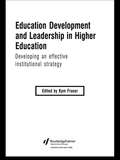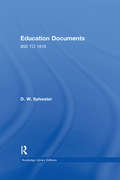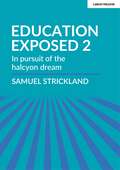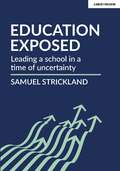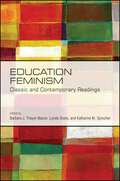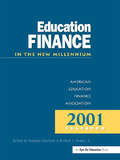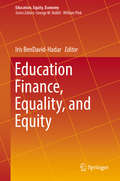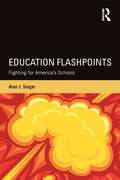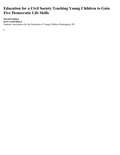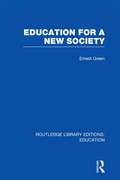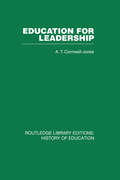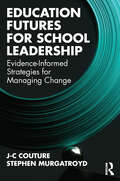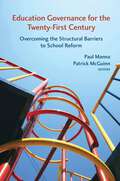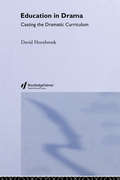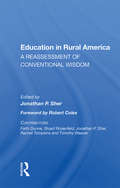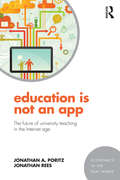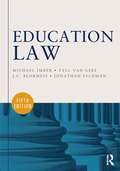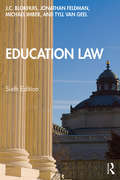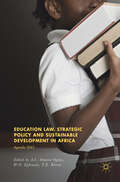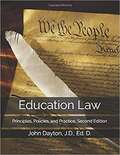- Table View
- List View
Education Development and Leadership in Higher Education: Implementing an Institutional Strategy (SEDA Series)
by Kym FraserIn today's highly competitive and globalized higher education market, leaders and managers find themselves considering the same issues of quality assurance, increased participation, the potential of new technologies and improving standards of teaching, learning and leadership. Education development has a central role to play in these areas, and should be a core element in the strategic positioning of all higher education institutions.This book is a packed with research and proven case study material on what education development can offer managers in higher education. It draws from worldwide experiences of leading innovative educational developers, and illustrates the numerous ways in which education development strategies, structures and processes can make a difference to an institution's corporate strategy.
Education Documents: ENGLAND AND WALES 800 TO 1972 (Routledge Library Editions)
by D. W. SylvesterThese collections of documentary material illustrate the main themes of educational history from the early middle ages to the late twentieth century. It contains extensive extracts from every major educational document of this period including royal and parliamentary commissions. Each document is supported by short commentaries and an annotated bibliography. Whilst the main theme is the creation of a genuine national education system, the volumes also address the relations between church and state in education, teacher training, the progressive development from elementary to primary and secondary education for all, and the growth of technical education from a private to a public activity.
Education Exposed 2: In pursuit of the halcyon dream
by Samuel StricklandEducation Exposed 2 follows on from Sam Strickland's first book, Education Exposed. The book is a pacy, punchy and forthright critique of how to drive the curriculum, behaviour and teaching within a school and the pivotal role that leadership plays in pursuing the halcyon dream. The book is neatly laid out, with each chapter identifying common curricular misconceptions, posing lots of key questions to consider and offering multiple practical ideas that you can take away. Every chapter ends with five key takeaway points for you to carefully consider.The book neatly interplays theory, research, Sam's expertise and experience coupled with a practical and real world approach. The first section of the book champions the importance of the curriculum and knowledge. The second section examines behaviour and how this can be driven by senior leaders coupled routine driven approach to learning. This section also takes you through a series of curriculum tools and teaching approaches that will assist you in thinking about how to implement and drive the curriculum. The third section of the book examines leadership; how leaders can champion the teacher as the expert and how a school culture can be supported and monitored carefully.Education Exposed 2 is relevant for anyone working in a school, irrespective of their position or role. It is designed to be an accessible, versatile and quick read. Equally, it can be used as a dip-in and dip-out guide. Multiple practical approaches and strategies are offered as key take-away points.
Education Exposed 2: In pursuit of the halcyon dream
by Samuel StricklandEducation Exposed 2 follows on from Sam Strickland's first book, Education Exposed. The book is a pacy, punchy and forthright critique of how to drive the curriculum, behaviour and teaching within a school and the pivotal role that leadership plays in pursuing the halcyon dream. The book is neatly laid out, with each chapter identifying common curricular misconceptions, posing lots of key questions to consider and offering multiple practical ideas that you can take away. Every chapter ends with five key takeaway points for you to carefully consider.The book neatly interplays theory, research, Sam's expertise and experience coupled with a practical and real world approach. The first section of the book champions the importance of the curriculum and knowledge. The second section examines behaviour and how this can be driven by senior leaders coupled routine driven approach to learning. This section also takes you through a series of curriculum tools and teaching approaches that will assist you in thinking about how to implement and drive the curriculum. The third section of the book examines leadership; how leaders can champion the teacher as the expert and how a school culture can be supported and monitored carefully.Education Exposed 2 is relevant for anyone working in a school, irrespective of their position or role. It is designed to be an accessible, versatile and quick read. Equally, it can be used as a dip-in and dip-out guide. Multiple practical approaches and strategies are offered as key take-away points.
Education Exposed: Leading a school in a time of uncertainty
by Samuel StricklandThe ultimate guide to understanding how a school can be led, managed and run, written by an author with extensive experience, and drawing heavily on research around knowledge-based curricula.Cleary and honestly stating the challenges of leading a school, Samuel Strickland focuses on approaches to the curriculum, teaching and learning, teacher workload, behavior, staff morale, leadership and Ofsted.
Education Exposed: Leading a school in a time of uncertainty
by Samuel StricklandThe ultimate guide to understanding how a school can be led, managed and run, written by an author with extensive experience, and drawing heavily on research around knowledge-based curricula.Cleary and honestly stating the challenges of leading a school, Samuel Strickland focuses on approaches to the curriculum, teaching and learning, teacher workload, behavior, staff morale, leadership and Ofsted.
Education Feminism: Classic and Contemporary Readings
by Barbara J. Thayer-Bacon; Lynda Stone; Katharine M. SprecherWinner of the 2015 Critics Choice Book Award presented by the American Educational Studies AssociationWinner of the 2015 Critics Choice Book Award presented by the American Educational Studies AssociationEducation Feminism is a revised and updated version of Lynda Stone's out-of-print anthology, The Education Feminism Reader. The text is intended as a course text and provides students a foundational base in feminist theories in education. The classics section is comprised of the readings that students have most responded to in classes. The contemporary readings section demonstrates how the third-wave feminist criticism of the 1990s has an impact on today's feminist work. Both of these sections address critical multicultural educational issues and have an inclusive, diverse selection of feminist scholars who bring race, class, sexual orientation, religious practices, and colonial/postcolonial perspectives to bear on their work. The individual essays are concise and well written and arranged in such a way that it is easy for instructors to assign them around themes of their own choosing.
Education Finance in the New Millenium
by Stephen Chaikind William J. FowlerThe 2001 Yearbook of the AEFA reaffirms the connections between the field of education finance and the wider education community. Among the topics it examines are curricula reform, outcome assessment, accountability, community control, and privatization. 2001.
Education Finance, Equality, and Equity (Education, Equity, Economy Ser. #5)
by Iris BenDavid-HadarThis volume revisits educational equality and equity issues, especially, in education finance-related topics consisting of 15 chapters and organized in two parts. The first part of the volume entitled “Education Finance”, focuses on equity aspects of resource allocation and its influence on education. The second part, entitled “Educational Equality and Equity”, focuses on the conceptualization, and the measurements of educational inequity, and inequality with special emphasis on the cost of inequality. The field of education finance has been significantly influencing policy-makers in many countries in recent years. This volume is focused on equity and equality in education finance in an international frame. This book would be of interest to (1) scholars at the fields of education finance, economics of education, and educational policy, (2) graduate students at the course of school finance or economics of education, and (3) local and global policy makers at the fields of education policy, and education finance.
Education Flashpoints: Fighting for America’s Schools
by Alan J. SingerDrawing on his widely read Huffington Post columns—rated one of the top educational blogs in the United States—Alan Singer introduces readers to contemporary issues in education in the United States. The issues are presented with a point of view and an edge intended to promote widespread classroom debate and discussion. Each section opens with a new topical summary essay followed by a series of brief essays updated and adapted from Huffington Post columns. The book includes guest contributions, guiding questions, and responses to essays by teacher education students and teachers to further classroom discussion. Education Flashpoints is written in a conversational style that draws readers into a series of debates by presenting issues in a clear and concise manner, but also with a touch of irony and a bit of rhetorical bite. The topics examined in these essays read like the latest newspaper headlines in the battle to define public education in the United States.
Education For A Civil Society: Teaching Young Children To Gain Five Democratic Life Skills
by Dan GartrellDemocratic life skills are skills that enable all of us—children and adults alike—to be caring, thoughtful members of families, schools, communities, and societies. But these emotional and social skills don’t just happen. Teachers and families support and nudge young children toward them, using guidance techniques that calm and teach. Completely updated and revised, the second edition of this classic resource provides relatable anecdotes and practical strategies for teachers to understand Why building secure relationships with children and families is so important—and eight communication practices to build them How viewing misbehavior as mistaken behavior allows you to focus on helping a child learn better ways to meet their needs When and how to use specific guidance practices to promote children’s healthy personal development and social cooperation How an encouraging learning community helps everyone move toward achieving their potential Whether you’re a veteran teacher or just embarking on your teaching journey, you’ll find what you need in this book to provide young children with a solid foundation for their—and society’s—future.
Education For A New Society (Routledge Library Editions: Education)
by Ernest Green Harold ShearmanAimed at the layperson, this book discusses education for the man or woman in the street and the advantages to society of having an educated population, with the aim of not just convincing people of the importance of education but persuading them to take participate actively in education.
Education For Leadership: The International Administrative Staff Colleges 1948-1984
by A T Cornwall-JonesAs well as being a history of administrative staff colleges in the UK, Australia, New Zealand, Pakistan, India, the Phillipines and Ghana between 1948 and 1984, the colleges' contribution to the development of effective managers is evaluated.
Education Futures for School Leadership: Evidence-Informed Strategies for Managing Change
by Stephen Murgatroyd J-C CoutureEducation Futures for School Leadership is a comprehensive resource to support school leaders as they encounter the growing complexity and uncertainties that characterize life in schools today. Moving beyond conventional change management literature, this book invites current and aspiring school leaders to apply the interdisciplinary tools of futures studies and strategic foresight to their work.Given our shared global challenges, young people deserve schools that are agile, adaptive, and responsive to many possible futures. Driven by the imperatives of equity and inclusion, the authors provide practical, evidence-informed strategies, real-world examples, and use cases of futures thinking applied to school staff development and change strategies. Each chapter engages with key educational realities: differentiating instructional planning and assessment, the impacts of artificial intelligence and other technologies, the growing psycho-social issues young people are facing, and more.Informed by years of international collaboration with forward-thinking school leaders and scholars, this book is both a field guide and a call to action for navigating the influence of the future on our present moment and the challenges and promises shaping school life today.
Education Governance for the Twenty-First Century: Overcoming the Structural Barriers to School Reform
by Paul Manna Patrick McguinnAmerica's fragmented, decentralized, politicized, and bureaucratic system of education governance is a major impediment to school reform.<P><P> In this important new book, a number of leading education scholars, analysts, and practitioners show that understanding the impact of specific policy changes in areas such as standards, testing, teachers, or school choice requires careful analysis of the broader governing arrangements that influence their content, implementation, and impact. Education Governance for the Twenty-First Century comprehensively assesses the strengths and weaknesses of what remains of the old in education governance, scrutinizes how traditional governance forms are changing, and suggests how governing arrangements might be further altered to produce better educational outcomes for children.Paul Manna, Patrick McGuinn, and their colleagues provide the analysis and alternatives that will inform attempts to adapt nineteenth and twentieth century governance structures to the new demands and opportunities of today.Contents:Education Governance in America: Who Leads When Everyone Is in Charge?, Patrick McGuinn and Paul MannaThe Failures of U.S. Education Governance Today, Chester E. Finn Jr. and Michael J. PetrilliHow Current Education Governance Distorts Financial Decisionmaking, Marguerite RozaGovernance Challenges to Innovators within the System, Michelle R. DavisGovernance Challenges to Innovators outside the System, Steven F. WilsonRethinking District Governance, Frederick M. Hess and Olivia M. MeeksInterstate Governance of Standards and Testing, Kathryn A. McDermottEducation Governance in Performance-Based Federalism, Kenneth K. WongThe Rise of Education Executives in the White House, State House, and Mayor's Office, Jeffrey R. HenigEnglish Perspectives on Education Governance and Delivery, Michael BarberEducation Governance in Canada and the United States, Sandra VergariEducation Governance in Comparative Perspective, Michael Mintrom and Richard WalleyGovernance Lessons from the Health Care and Environment Sectors, Barry G. RabeToward a Coherent and Fair Funding System, Cynthia G. BrownPicturing a Different Governance Structure for Public Education, Paul T. HillFrom Theory to Results in Governance Reform, Kenneth J. MeierThe Tall Task of Education Governance Reform, Paul Manna and Patrick McGuinn
Education In Drama
by David HornbrookHornbrook, referring to current legislation, argues the case for an organized curricular framework for drama in the 1990s which develops in children the activities of designing, directing, acting, writing and evaluating - all within the range of the historic context of dramatic work. He asserts that recent drama teaching in Britain has been child-centred and psychological, and viewed as a learning medium rather than as an aesthetic study in itself. This, he believes, has had the effect of cutting children off from the variegated world of the theatre and, in the broader sense, from any collective aesthetic or historical dimension. This book is intended mainly for the use of primary and secondary school teachers.
Education In Rural America: A Reassessment Of Conventional Wisdom
by Jonathan P. SherIndifference has not always characterized American attitudes toward rural children, nor has neglect always been the cornerstone of state and federal policy toward rural education. Indeed, for nearly a century there was an avid and influential—though ultimately ineffective—rural school reform movement in the United States. But in recent years, rural education has become a "skeleton in the closet" of the education profession. More than 14 million children attend rural schools that receive only minuscule amounts of the nation s financial resources and professional attention. The authors of this book carefully analyze the beliefs, assumptions, policies, and practices that have shaped and continue to shape education in rural America, concluding that conventional wisdom in rural education has proved to be considerably more conventional than wise. They offer pragmatic suggestions for changes in rural schools, in educational policy, and in programs designed for rural communities. As Robert Coles tells us in his Foreword to the book, they "give us clear, strong, uncluttered prose—a good sign that they are able to offer sensible, honest, unpretentious suggestions and useful ideas. They give us. . .a social history that enables perspective . . . and [they give us] practical, well-argued suggestions for a public policy both humane and capable of realization for our rural areas."
Education Is Not an App: The future of university teaching in the Internet age (Economics in the Real World)
by Jonathan Rees Jonathan A. PoritzWhilst much has been written about the doors that technology can open for students, less has been said about its impact on teachers and professors. Although technology undoubtedly brings with it huge opportunities within higher education, there is also the fear that it will have a negative effect both on faculty and on teaching standards. Education Is Not an App offers a bold and provocative analysis of the economic context within which educational technology is being implemented, not least the financial problems currently facing higher education institutions around the world. The book emphasizes the issue of control as being a key factor in whether educational technology is used for good purposes or bad purposes, arguing that technology has great potential if placed in caring hands. Whilst it is a guide to the newest developments in education technology, it is also a book for those faculty, technology professionals, and higher education policy-makers who want to understand the economic and pedagogical impact of technology on professors and students. It advocates a path into the future based on faculty autonomy, shared governance, and concentration on the university’s traditional role of promoting the common good. Offering the first critical, in-depth assessment of the political economy of education technology, this book will serve as an invaluable guide to concerned faculty, as well as to anyone with an interest in the future of higher education.
Education Is Not an App: The future of university teaching in the Internet age (Economics in the Real World)
by Jonathan A. Poritz Jonathan ReesWhilst much has been written about the doors that technology can open for students, less has been said about its impact on teachers and professors. Although technology undoubtedly brings with it huge opportunities within higher education, there is also the fear that it will have a negative effect both on faculty and on teaching standards.Education Is Not an App offers a bold and provocative analysis of the economic context within which educational technology is being implemented, not least the financial problems currently facing higher education institutions around the world. The book emphasizes the issue of control as being a key factor in whether educational technology is used for good purposes or bad purposes, arguing that technology has great potential if placed in caring hands. Whilst it is a guide to the newest developments in education technology, it is also a book for those faculty, technology professionals, and higher education policy-makers who want to understand the economic and pedagogical impact of technology on professors and students. It advocates a path into the future based on faculty autonomy, shared governance, and concentration on the university’s traditional role of promoting the common good.Offering the first critical, in-depth assessment of the political economy of education technology, this book will serve as an invaluable guide to concerned faculty, as well as to anyone with an interest in the future of higher education.
Education Law
by Tyll Van Geel Michael Imber Jonathan Feldman J. C. BlokhuisEducation Law, 5th Edition provides a comprehensive survey of the legal problems and issues that confront school administrators and policymakers today. This textbook is organized around the belief that students need to read court cases to understand the subtlety and richness of the law, but for legal neophytes, cases without discussion and interpretation are often too difficult to comprehend. Thus, the text balances an explanation of the important principles of education law, with actual court decisions to illuminate these concepts. The court decisions are carefully edited to highlight issues most relevant to administrators, and each chapter explores implications for policy and practice. New in the Fifth Edition: Additional content on bullying, student privacy, free speech rights, teacher evaluation, collective bargaining, and issues relating to Internet and technology. Revision of materials dealing with education policy and updating of references and case law throughout. A companion website with materials for students and instructors, including links to full cases, a glossary of key concepts, and discussion questions to help students further engage with the content.
Education Law
by Michael Imber Jonathan Feldman Tyll van Geel J.C. BlokhuisEducation Law, Sixth Edition provides a comprehensive survey of the legal problems and issues confronting school leaders, teachers, and policymakers today. Court cases accompanied by explanation and analysis can help aspiring educators understand the subtlety and richness of the law. Accordingly, each of the 12 thematic chapters begins with an overview, concludes with a summary, and balances an explanation of the important principles of education law with actual court decisions to illuminate those issues most relevant for educational policy and practice. This updated and expanded Sixth Edition includes: Revision of case law, education policy, and citations to reflect the most recent decisions and developments in the field. Cases and commentary on key topics such as constitutional rights of students in public schools, school discipline, safety, and zero tolerance policies, school choice and parental rights claims, the regulation of charter schools and home-based education, cyberbullying and the regulation of online speech, racial and sexual harassment policies, and collective bargaining, unions, and working conditions. eResources accessible at www.routledge.com/9780367195250 include a Glossary for students, Chapter Outlines and Abstracts for instructors, as well as Tables of Cases.
Education Law, Strategic Policy and Sustainable Development in Africa: Agenda 2063
by A. C. Onuora-Oguno W. O. Egbewole T. E. KlevenThis book outlines the findings and suggestions of the Law and Society Association’s International Research Collaborations, which focused on the African Union’s Agenda 2063. This outlined the ideal Africa aspired to by the year 2063: ‘the Africa we want’. The authors examine socio-economic rights issues and their impact on developing a strong educational agenda that can drive Africa to realize Agenda 2063. As Africa’s development has remained slow in the face of many challenges, the need to embrace good governance, rule of law and human rights obligations are major tools to realize the continent’s potential. The project focuses in particular on the central place of education law and policy in achieving the goals of Agenda 2063.
Education Law: A Problem-Based Approach
by Scott F. Johnson Sarah E. RedfieldEducation Law: A Problem-Based Approach offers a problem based approach to teaching education law. The book covers both the standard education law topics and cutting-edge topics such as the Internet, electronic speech, discipline for off-campus behavior, cyber-bullying, strip searches, and various issues regarding NCLB and education reform. The book also provides a guided, hands-on approach that gives students an opportunity to go outside of the text and gather information about how certain aspects of education law work in ""the real world"" and in their own states.
Education Law: Cases and Materials
by Lawrence Rossow Jacqueline StefkovichEducation Law aims to improve upon the current offerings in other education law texts. It presents full, unedited cases; therefore, it strikes a balance between explanatory material and case law presentation.
Education Law: Principles, Policies, and Practice
by John DaytonThis book is designed to actively engage you in learning education law and in building a strong working knowledge of the law in practice. This book provides you with the highest quality scholarship and learning tools at a welcomed reader friendly price: Perfect as both a compelling and engaging textbook and as an invaluable desktop reference for daily use in practice.
